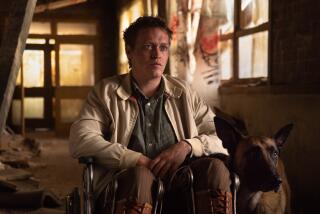Review: Liam Neeson sticks to the formula, and sticks to it well, in ‘The Commuter’
January is the grimmest month as far as new releases are concerned, an elephant’s graveyard where signs of life are few. So it’s a good thing we can count on Liam Neeson to periodically rescue us from these dark and desperate times.
Starting with “Taken” a decade ago, a saga successful enough to spawn two sequels, Neeson has transformed himself into a berserker for our time, an action hero who will go to any and all lengths to right wrongs and rescue those close to him.
Now comes “The Commuter,” the fourth collaboration between Neeson and director Jaume Collet-Serra. As in the previous films (“Unknown,” “Non-Stop,” “Run All Night”) “The Commuter” puts an increasingly desperate, exhausted character into an all but impossible situation and watches as he throws every fiber of his being into battling his way out of it.
Calling many of these scenarios, very much including the one in “The Commuter,” far-fetched is to understate the case, but that has always been part of their charm.
That and the fact that Neeson, in addition to being a rangy 6-foot-4, is an accomplished actor with lots of serious work to his credit as well as the uncanny ability to be simultaneously everyman and Superman.
As written by Byron Willinger, Philip de Blasi and Ryan Engle, “The Commuter” has a lot in common with “Non-Stop,” which cast Neeson as a U.S. air marshal with an alcohol problem who has to prevent a serial killer from doing his worst on a trans-Atlantic flight.
This time around, as the title indicates, Neeson is taking the train, not the plane. He plays a harried commuter who has to stop a conspiracy so complicated he probably wishes he had something as simple as a serial killer to deal with. It’s not the best of the series, but it gets the job done.
Before we get to the nefarious acts of the film’s evildoers, however, “The Commuter” takes its time setting up its protagonist, showing us how and why Neeson’s Michael MacCauley became desperate enough to set the plot’s central conceit into motion.
A montage of shots over time of MacCauley rising in the morning, getting his wife and son squared away and headed out to work reveals the man to be an ordinary commuter, someone who has spent the last 10 years taking a train from leafy Tarrytown, N.Y., into the concrete jungle of Manhattan and then back home again.
Once a New York City cop (where he picked up some skills that just might come in handy), MacCauley became a life insurance salesman to better support his family, but all that is about to change.
Out of nowhere, just a few years before retirement, MacCauley is fired by his boss, just when a crushing combination of financial obligations places him in desperate need of funds.
After having a beer with his old police partner Alex Murphy (the reliable Patrick Wilson), MacCauley heads for the train home to break the bad news to his family. “If you want to know what God thinks about money,” he sourly tells his pal, “look who he gives it to.”
The uneventful ride MacCauley is anticipating, however, does not materialize. Not even close.
Taking the seat directly across from him is the formidably enigmatic Joanna (the always effective Vera Farmiga), who introduces herself as an expert in human behavior. “What kind of person are you?” she asks. “Let’s do an experiment.”
Joanna presents MacCauley with a theoretical proposition, the chance to do something that means little to him but is critical to her shadowy confederates, a proposition that turns out to be all too real.
There is someone on this train, says Joanna, who doesn’t belong here, someone who is not one of the regular commuters. Find that person, place a tracking device on him or her, and end up with $100,000, no questions asked.
Weakened by his suddenly impoverished situation, MacCauley says he will do it, a decision he will soon regret, but it is too late, way too late, to change his mind.
For though Joanna quickly exits the train, she and her confederates have eyes and ears everywhere, they know MacCauley’s every move, they even threaten (never a good idea when dealing with a Neeson character) to harm his family if he doesn’t stick to the bargain.
With elements lifted from “Murder on the Orient Express,” “Runaway Train,” even, God help us, “Spartacus,” “The Commuter” is burdened with a story line that gets increasingly far-fetched, inconsistent and hard to follow.
But while it doesn’t pay to think too hard about the plot, after four of these films, director Collet-Serra, shooting here on a 30-ton set put together from authentic discarded railroad scrap, is an expert, so to speak, at making this kind of train run on time.
Once MacCauley takes a deep breath and says, “I’m done playing games,” audiences can breathe freely as well. It’s Neeson Time, and it’s not in the man to let us down.
‘The Commuter’
Rating: PG-13 for some intense action/violence, and language
Running time: 1 hour, 45 minutes
Playing: In general release
See the most-read stories in Entertainment this hour »
Movie Trailers
More to Read
Only good movies
Get the Indie Focus newsletter, Mark Olsen's weekly guide to the world of cinema.
You may occasionally receive promotional content from the Los Angeles Times.







